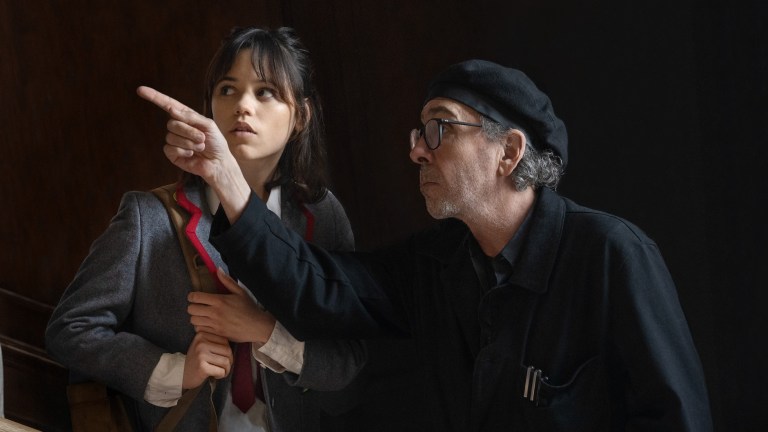Beetlejuice Beetlejuice’s Jenna Ortega Talks Doing Another Literal Dance with Tim Burton
We chat with the stars of Beetlejuice Beetlejuice, including Jenna Ortega and Catherine O’Hara, about returning to the ghost house, new dance moves in a Tim Burton joint, and what Wednesday Addams would make of this world.

Warner Bros.’ hotly anticipated sequel Beetlejuice Beetlejuice sees the star Michael Keaton and director Tim Burton reunite to give us more of “the ghost with the most,” but to introduce said ghost to Gen Alpha, the pair have recruited Burton’s Wednesday series lead Jenna Ortega as the daughter of Winona Ryder’s Lydia Deetz.
When we spoke with Ortega last month, she told us that one aspect of making the sequel which she found cool was the multiple musical numbers both she and co-star Catherine O’Hara participated in. We will not spoil either standout sequence here, although you can see glimpses of their forced vamping in the trailer, but it’s safe to say Ortega is no stranger to such things after doing her own choreography in the now viral Wednesday school dance number set to The Cramps’ “Goo Goo Muck.” Meanwhile O’Hara was part of the iconic Harry Belafonte “Day-O” dance in the first Beetlejuice.
The one thing those now famed musical numbers have in common? They were directed by Burton, and both actresses felt that energy and anticipation levels were spiking when shooting days for new musical sequences on a Burton set were afoot.
“It was crazy and great… Mostly because we didn’t know what we were doing!” O’Hara laughs at the pair’s unlikely duet in Beetlejuice Beetlejuice. “It’s stress, but an exciting and fun stress.” She even notes there was a choreographer on-set for this one, but they were still encouraged to improvise long after they ran through the set moves. “He’s like, whatever!”
Ortega shares the chuckle, recalling her director’s own specific choreographic style.
“Tim’s like we’re apparently [not] going to use this, but just leave the takes rolling,” the Wednesday star says. “I think part of it was making each other break or seeing what we could do to ruin the shot, which is good as well.”
Both actors are of course veterans of Burton’s process, and for his penchant for dancing around eccentric outsiders. After all, those character types have been Burton’s modus operandi for 40 years. They also seem to see more than a little of the Tim they know extended into the characters they’re playing.
“I would say for Astrid it’s the sense of feeling misunderstood and also just not really caring for people’s BS,” Ortega says of her character.. “I feel like Tim has a pretty good read on people, and Astrid’s the same way. She can meet someone and clock everything that’s wrong with them within the first 20-seconds.”
“Well, Delia’s an artist just like Tim,” adds O’Hara. “Delia’s just as talented as Tim Burton… in her dreams.”
Of course it helps that O’Hara’s husband, the original Beetlejuice‘s production designer Bo Welch, is credited as a visual consultant on the new movie, which carries forth the same sense of cartoonish macabre.
“Does he have a credit?” O’Hara beams when we mention the nod. “Okay, because I saw the movie and forgot to look for that.”
One of the film’s supporting players, Justin Theroux, was thrilled to be a part of those throwback visuals Burton concocted for Beetlejuice Beetlejuice.
“For Tim it really feels like a return to a kind of filmmaking that he hadn’t been able to do in awhile, which is very practical,” Theroux admits. “Feels almost borderline independent, it doesn’t feel like a studio. It is a studio movie, obviously, but it doesn’t feel like it. It feels like it has this handmade quality to it, which is a return to the original. There’s something about this film that when I read the script I was like, ‘Oh, that makes sense.’ Then when I saw the movie, I was like, ‘Oh, this absolutely makes sense.’ It feels just big enough or bigger enough that it ticks all those boxes, but it takes some really wild turns that a lot of studio movies don’t get to take anymore… or don’t take.”
A major visual inspiration for Burton since the beginning of his career has been Mario Bava, the Italian genre auteur behind such cult classics as Black Sunday and Kill Baby Kill, which are referenced directly in Beetlejuice Beetlejuice. There is even a major flashback sequence in black and white featuring Monica Bellucci’s character paying loving homage to Bava.
“There are many tributes in this movie about Italy and Italian cinema because—of course—there are references to Maria Bava and also Beetlejuice has moments where he speaks in Italian,” Bellucci tells us. “Also there is this moment where we hear an aria of Maria Callas, even though she’s not Italian, but she became a superstar in Italy. So we can feel that Tim really loves Italian movies, and Italian cinema is an inspiration for him.”
Bellucci herself is no stranger to gothic worlds, having appeared in Bram Stoker’s Dracula, Brotherhood of the Wolf, and The Brothers Grimm.
“It’s because I love comic books and this dreamy kind of atmosphere,” Bellucci explains of her many goth roles. “I think Tim knows how to create situations that are funny, scary, shocking, unpredictable, but at the same time also emotional and deep.”
O’Hara, a cast member of both Beetlejuice movies, agrees that Burton knows how to make seemingly silly stories generate genuine moments of pathos or sympathy.”
“Most of us just think that way, you want to have it all there,” says O’Hara. “It’s been said a zillion times, but life is a mixture of all those things, all those emotions, and laughter is just such a beautiful gift that we’ve been given to release us from pain and sorrow and scary moments in our life. Anybody who wants to make a good story tries to get it all in there… The story definitely helped ground the women’s characters, especially what Lydia and Delia and Astrid were going through and what Beetlejuice was going through. I love to see the vulnerability of Beetlejuice actually scared of his ex wife. It’s so hilarious.”
That vengeful ex-wife character of Delores, as embodied by Bellucci, comes across as a mix of some of Burton’s most iconic female characters including Sally from Nightmare Before Christmas, Emily from Corpse Bride, or Vampira from Ed Wood.
States Bellucci, “Tim creates this creature—I think she’s more a creature instead of a monster—but what I like about her is there is a duality, because she’s scary but also funny. Even though she’s dead, she’s full of life because she’s looking for vengeance. She’s dangerous, and there’s some glamor over there, and I have to say that we all have emotional scars and she has scars all over. She’s like a metaphor of reality in some way. In the scene where she puts herself together it took two or three days to film it and felt a bit like mime. I tried to move like a broken doll. I like when you have the chance to give life to a character through your body, because the body is your instrument as an actor.”
Delores isn’t the only one who has it out for Beetlejuice, apparently. While Astrid may be an outcast private school student, Ortega’s recent foray as Wednesday Addams made us wonder how that character would have handled Beetlejuice’s shenanigans.
“I think she would have killed him,” Ortega opines of a Wednesday vs. Beetlejuice showdown. “I think it’s kind of funny, because the way that Michael was scared of Monica Bellucci’s character Delores… I think it maybe would have been the same. She probably could have given him a run for his money. She also would have liked the afterlife, and probably wouldn’t want to leave it—the way it looked in this movie, anyway.”
Beetlejuice Beetlejuice is in theaters now.
